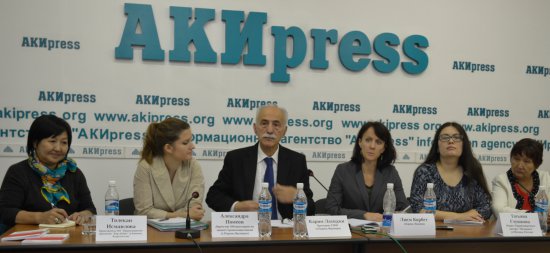Press Release: Pivotal moment for democracy in Kyrgyzstan: defenders facing increasing pressure - Preliminary findings of a fact-finding mission on the conditions and vulnerabilities of human rights defenders and organisations

The Observatory delegation met with the Deputy Prime Minister, the FirstDeputy Minister of the Ministry of Internal Affairs, the Deputy of theOmbudsman of Kyrgyz Republic, the Ombudsman of Jalal-Abad , the Ombudsman ofOsh, the Deputy Prosecutor General of the Republic, the Head of theInter-Ethnic and Religious Affairs under the Presidency, as well as civilsociety representatives in Bishkek, Osh and Jalal-Abad.
The delegation urged them to protect the space of human rights defendersand to oppose the passing of several laws, notably one imposing thestigmatising label of « foreign agents » for NGOs receiving foreignfunding and one criminalising ‘promotion’ of the equality of rights of LGBTIpersons.
“FIDH and OMCT fear that the passing of these laws will not only silencehuman rights defenders but also put a fatal end to the construction of ademocratic system in Kyrgyzstan”, declared Karim Lahidji, FIDH president, who was heading the mission.
For many years, Kyrgyz civil society has been considered one of the strongestin Central Asia. But, recently, while the country has joined the EurasianCustoms Union, Russia has also traded bad practices with the introduction ofRussian like draft laws that endanger the freedoms of association, expressionand peaceful assembly.
“Despite the fact that Kyrgyz authorities have been developing humanrights institutions in recent years, most of them, in keeping with Soviettradition, remain a facade and are not functioning effectively”, declared Tatiana Glushkova, lawyer with the Human Rights Centre“Memorial”.
One day before the end of the mission, the authorities have failed to issue a permissionto visit Uzbek minority human rights defender Mr. Azimjan Askarov, sentenced to life in prison in 2010, following theethnic clashes in southern Kyrgyzstan.
Watch the press conference (Bishkek, 25 September 2015)
“Azimjan Askarov is paying the highest price of a subtly increasingrepressive policy. The Kyrgyz human rights community remains dynamic butsuffers following the multiplication of acts of intimidation”, declared Alexandra Pomeon, FIDH Director of theObservatory for Protection of Human Rights Defenders, who was also part of themission.
A mission report will be issued in the coming monthsand will present detailed conclusions and recommendations to the Government ofKyrgyzstan, non-State actors, the United Nations, the European Union and foreign embassies inKyrgyzstan.
The Observatory for the Protection of HumanRights Defenders (OBS) was created in 1997 by FIDH and the WorldOrganisation Against Torture (OMCT). The objective of this programme is tointervene to prevent or remedy situations of repression against human rightsdefenders.
For more information, pleasecontact:
• FIDH: Arthur Manet / Audrey Couprie: + 33143552518
• OMCT: Miguel Martín Zumalacárregui: +41228094924
Tags
Attachments
-
- image
ViewArton18458 ba45b
Related resources
-
- Kyrgyzstan
- 21.05.15
- Urgent Interventions
Read moreAssault against participants to an anti-homophobia event organised by Labris